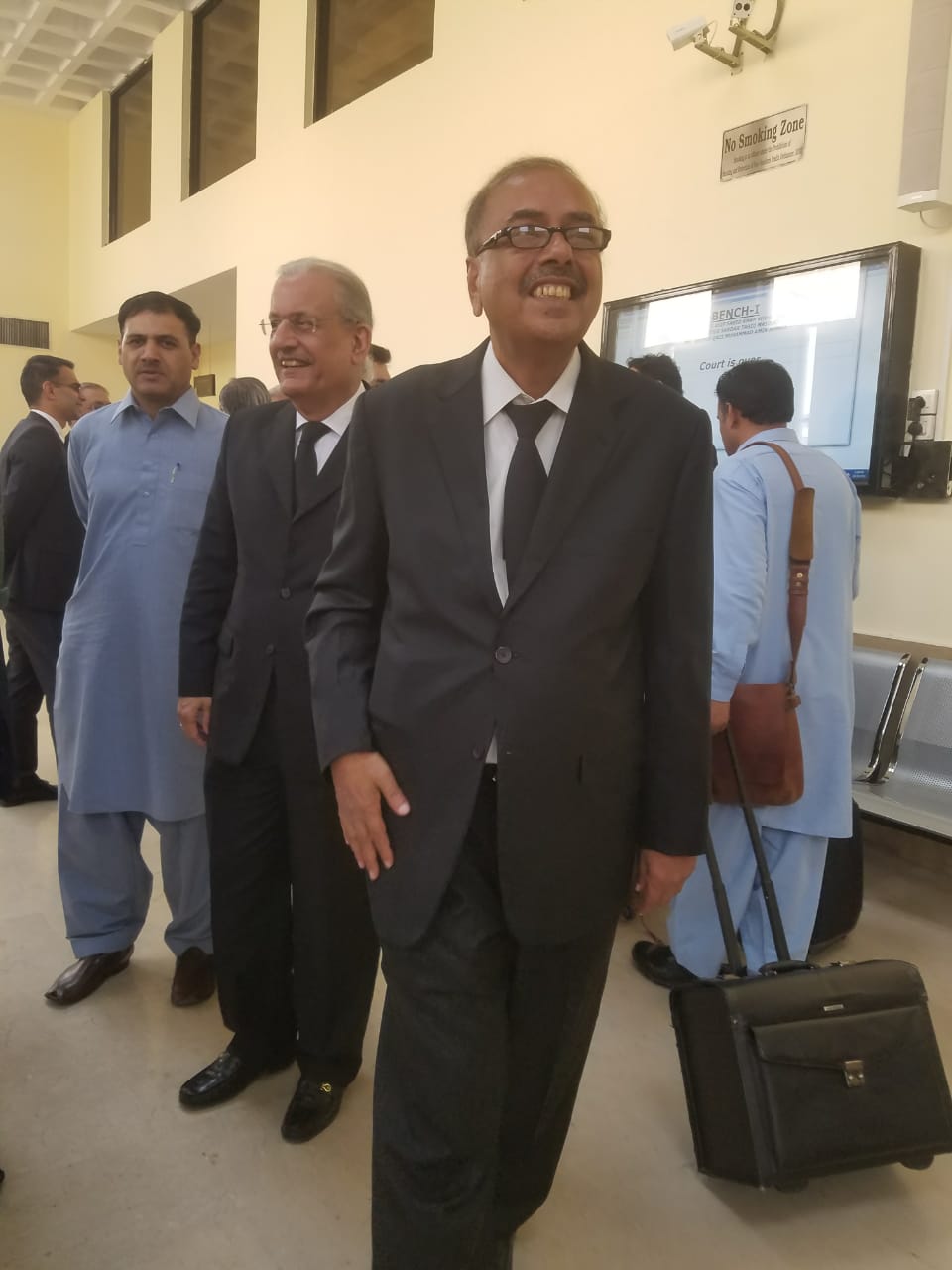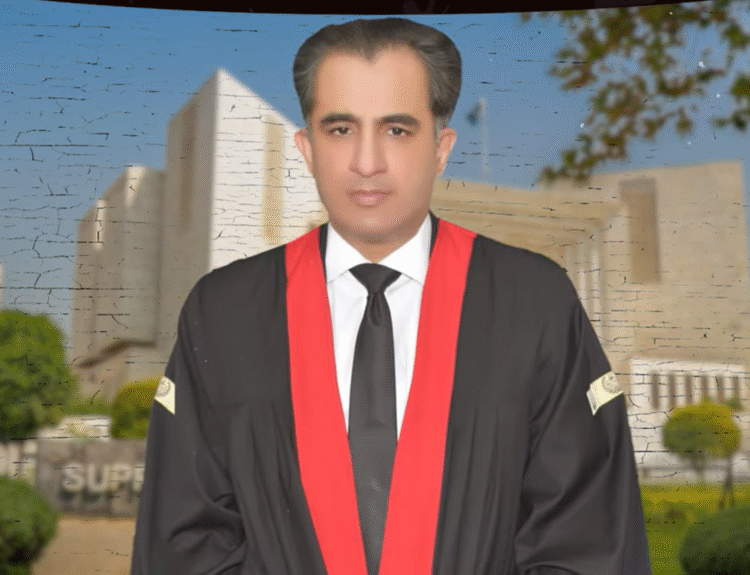By Khalid Hussain
The President does not enjoy blanket immunity under Article 209 and his actions leading to the sending a reference against Justice Qazi Faez Isa to the Supreme Judicial Council (SJC) are open to judicial review like any other exercise of executive authority, Munir A. Malik aggressively went after President Arif Alvi as he argued on Tuesday when the the full court of the Supreme Court (SC) of Pakistan resumed hearing into the Justice Qazi’s Petition.
Judges were excited at the allegations of malice against the President of Pakistan leading to malafide action and the issue of immunity of the President created a lively exchange between the judges and the Petitioner’s counsel that kept the full house in court room one riveted to the lively proceedings. Malik spelled out eight stages under Article 209 for the removal of a superior court judge arguing that the first four stages consist of ordinary administrative executive actions and do not afford immunity for the President’s actions from judicial review.
“From receiving information to collection of evidence and receiving advice to the creation of opinion are four stages that lead to the presidential direction –commonly referred to as sending a reference—to the SJC to inquire into the matter”, explained the former Attorney General (AG) and past President of the Supreme Court Bar Association (SCBA) Munir A. Malik who is the counsel of Justice Qazi Faez Isa. The council may proceed to ascertain the allegations against the judge, he said, adding, if the SJC finds the judge guilty then that is the end of the matter, else it makes a report to the President. The final step is the removal of the judge if found guilty by the President on the recommendation of the SJC. “The proceedings of the SJC cannot be challenged”, Malik held.
There as a great deal of discussion as judges posed many questions to Malik on the immunity enjoyed by the President of Pakistan. Justice Muneeb Akhtar was the most inquisitive while Justice Umar Ata Bandial –leading the full court—was the most argumentative. Justices Faisal Arab, Mansoor Ali Khan, Shaharyar Afridi and Maqbook Baqir also asked many questions around the immunity of the President in sending a reference to the SJC.
“Provisions under Article 209 has eight stages”, he reiteratated before reading from the Constitution of Pakistan the Bar of Jurisdiction. “Article 211 is limited to only three matters: the proceedings before the Council, its report to the President and the removal of a Judge under clause (6) of Article 209 shall not be called in question in any court”. Further elaborating the word ‘proceedings’, Malik said the Oxford dictionary gives the meanings to include acts, actions, steps, deeds and happenings before the SJC. And declared that whatever takes place elsewhere is not part of the ‘proceedings’ under Article 211 and can be challenged as it is open to judicial review like any other executive order or action of the government. This included the collection of information and evidence and formation of opinion by the executive, he declared.
Justice Bandial asked Malik to explain if the SJC was bound to carry out an inquiry or was that just an option when the President sends a direction i.e. the reference. Malik refused to enter into that line of argumentation saying he will argue this before the SJC during its proceedings.
“My submission is that certain malafide actions are to be judged. Collection of material against my client was unreasonable. It violated the constitutionally protected trichotomy of powers of the state and deviated from laid down procedures”, he said, alleging, “The Pre-reference stages were marred by malice”.
Justice Bandial intervened to note malice denotes wrongful purpose or when sometimes unfounded allegations are made. He asked Malik how he approaches malice and how did the SJC perceive it in the reference against Justice Qazi. Justice Muneeb Akhter asked if he meant to question was the President warranted to file the reference?
Malik replied that the SJC jurisdiction is limited to a domestic inquiry into the facts before it. “It cannot go into the question of the formation of opinion. Neither can it look at the malafide intent and malice. The question of the probative value of the evidence is key. The SJC is only a fact finding domestic council. All it can do is to judge one way or another. It cannot go into other questions”, Malik expounded.
It if the prayer before this apex court to look at those actions that are open to ordinary judicial review. The President was bound to follow the laid down procedure and his actions leading to sending the reference to the SJC are not protected by any immunity whatsoever. “These are the stages where SJC has no jurisdiction”, asked Justice Muneeb Akhtar. “Yes, my lord”, Malik replied emphatically, adding, “What cannot be done directly, cannot be done indirectly”.
Earlier the proceedings started with Malik going on the offensive charging the executive carried out illegal investigations and surveillance of Justice Qazi and his family members. “From the malicious reference to the orchestration of a media campaign to malign the judge of the superior court, the executive has violated the trichotomy of powers enshrined in the constitution”, he declared. Detailing tax authority letters from the many civil miscellaneous applications (CMAs), to the National Database Registration Authority (NADRA) probes into the identity card issued to Mrs. Qazi and citing the FIA expert report on the Spanish passport held by her, he said an impression was created as if she was being deceptive in creating dual identities while the simple fact of the matter was that she was required to give her father’s name while applying for a Spanish passport!
Sharing details of Justice Qazi and his spouse’s travels as inquired by the full court the day before, he said the Petitioner and his wife did not visit the United Kingdom any time in the year 2019. He also gave details of travels to and from Pakistan by Justice Qazi’s son and daughter. Justice Muneeb inquired since he was alleging his client and his family were subjected to surveilance could he explain how it was carried out? “By hacking my email, following me or my family members, may be the protocol officer spied, I cannot say.
And dropping something akin to a bomb in the court room, he declared that he has consulted with his client who is willing to submit “an affidavit to the court under a special oath that he and his family members were surveilled”. This alarmed Attorney Geneal Mansoor Anwer who was immediately upon his feet objecting to the suggestion of placing on record what he called “new evidence” under article 184. Hitherto the learned AG had been relaxed giving the odd impression as if the the defence of the federation was left to the full court and he had nothing better to do but to listen to Munir A. Malik while lounging in his seat. Malik did not press the offer upon his objection.
Malik reiterated that complainant Abdul Waheed Dogar did not have the exact address for Mrs. Qazi. Justice Bandial said the President has other sources of information. “Only if he authorized the process of information collection”, Malik shot back.
Justice Muneeb Akhter noted that Malik was making inferences that there was surveillance as none of this was an established fact. “The only categorical point you took is that it started early this year”, he said. This is all speculative. He asked, “Are you making a case of malafide based on speculations?”
Malik submitted that there is a need to draw a distinction between speculation and inference. “The federation has given no information in their reply or their concise statement how they got the information”, he said. “Private security and investigation agencies were hired. It part of the record. The federation has filed it which proves that I was under surveillance”. Citing a letter by Chairman Asset Recovery Unit (ARU) dated 20 June 2019 he pointed out it was after the fact of the reference that was filed on 20 May 2019, he said it says the ARU has further investigated. He loudly asked, “Once the reference is in the SJC what business does the ARU have to investigate the matter?”
“They hired a tracing agent firm “Find UK People” that trail, investigate and find people. This proves I was investigated, he submitted.
Justice Bandial asked if the reference has to be an open and shut case or is based on prima facie evidence. “Collection of evidence is not ARU domain but the SJC’s”, Malik shot back after arguing that it varies from case to case how the evidence fares.
Justice Mansoor Ali Khan said the President may want to know and or the Prime Minister whether or not the facts of the case are founded. “But it happened at the ARU. It cannot be done when it adds to the reference with the SJC. The Presidential Reference has seen the allegations shift from tax matter to Benami property”, he noted.
Justice Faisal Arab noted that evidence is needed to support the charges contained in the reference. “Collection of evidence has to be authorized by the President”, Malik stated firmly.
Justice Mansoor Ali Khan also asked the President may be asking the ARU to fill in the information. Malik responded, “The President would have to authorize collection of evidence. Else it is in violation of the system of trichotomy of powers. The judiciary is to be isolated form the victimisation of the executive in the discharge of its duties”, he explained.
Justice Bandial thanked cousel Munir A. Malik saying, “It is a pleasure to listen to such excellent arguments. I thank you on behalf of my brothers”.
The court adjourned till next Monday in view of the impending SCBA elections.




